- Home
- Robert Goddard
Out of the Sun
Out of the Sun Read online
Out of the Sun by Robert Godddard
Also by Robert Goddard
PAST CARING
IN PALE BATTALIONS
PAINTING THE DARKNESS
INTO THE BLUE
TAKE NO FAREWELL
HAND IN GLOVE
CLOSED CIRCLE
BORROWED TIME
Robert Goddard
OUT OF THE SUN
BANTAM PRESS
LONDON NEW YORK TORONTO SYDNEY AUCKLAND
TRANS WORLD PUBLISHERS LTD
61-63 Uxbridge Road, London W5 5SA
TRANS WORLD PUBLISHERS (AUSTRALIA) PTY LTD 15-23 Helles Avenue, Moorebank, NSW 2170
TRANS WORLD PUBLISHERS (NZ) LTD 3 William Pickering Drive, Albany, Auckland
Published 1996 by Bantam Press a division of Transworld Publishers Ltd
Copyright Robert Goddard 1996
The right of Robert Goddard to be identified as the author of this work has been asserted in accordance with sections 77 and 78 of the Copyright Designs and Patents
Act 1988.
All of the characters in this book are fictitious, and any resemblance to actual persons, living or dead,
is purely coincidental.
A catalogue record for this book is available from the British Library
ISBN 0593 03614X
All rights reserved. No part of this publication may be reproduced, stored in a retrieval system, or transmitted in any form or by any means,
electronic, mechanical, photocopying, recording,
or otherwise, without the prior permission of the publishers.
Typeset in 11/12 ‘/ipt Linotype Times by Kestrel Data, Exeter, Devon.
Printed in Great Britain by Mackays of Chatham plc, Chatham, Kent.
OUT OF THE SUN
ONE
If he left now, of course, or even five minutes from now, it would still be all right. The only problem was that he was not going to leave. He knew that. And so did she.
Top up?”
“Better not. I won’t be able to see to paint straight.”
Then don’t try.”
“What about Claude? He won’t be pleased if the job’s not finished by the weekend.”
“I’ll tell him it rained.”
“Will he believe you?”
“Who cares? Now, what about that drink?”
“You shouldn’t tempt me.”
“Who says I’m trying to?” She tipped the bottle and gin fizzed into his glass.
Trying or not,” he said, raising the glass to his lips and swallowing some of the strengthened mixture with deliberate relish, ‘you do.”
“Do I?”
“Oh yes. Very much. And I’ve never been any good at resisting temptation.”
“Haven’t you?”
“No.”
That’s funny.”
“Why?”
“Because neither have I, Harry.”
Thirty-four years, three months and several days later, Harry Barnett’s thoughts found nothing to tempt him as he trudged south along Scrubs Lane into a stiff autumnal breeze soured by traffic fumes and an ammoniated cocktail of industrial pollution. A top up was definitely not in order. Glancing from the crest of the railway bridge out across the pale expanse of Kensal Green Cemetery, its sepulchred ranks an even colder shade of grey than the grimy London sky, Harry would have agreed that just about the last thing his life needed at the moment was an extra dose of any one of its dismal ingredients.
Not the least dismal of those ingredients was his part-time job at the Mitre Bridge Service Station, which lay halfway down Scrubs Lane towards the A40 fly over He was already late for his five-hour stint of cash-counting and card-swiping, but his right ankle was giving him such gyp following a stumble on the way home from the Stonemasons’ Arms last night that acceleration was out of the question. Besides, Shafiq was an understanding fellow. For a Muslim, he was really amazingly tolerant of the scrapes a chap could get into after a few too many. He would complain, of course. That was only to be expected. That was, in a sense, how both of them retained their sanity.
Strangely, however, when Harry turned into the forecourt at Mitre Bridge a few minutes later and made his way none too quickly through the petrol-marbled puddles towards the shop, Shafiq looked up from behind the counter with an expression of puzzled sympathy rather than the over-rehearsed scowl Harry had expected. As a result, before he had even pushed open the door, he was worried. Though not, as it was to turn out, half as worried as he should have been.
“Harry, my friend,” said Shafiq, ‘it is good to see you.” There’s no need to be sarcastic. I got here as soon as “I am not being sarcastic, Harry. How could you think such a thing?”
“Easily. But never mind. I’m here now. You can beetle off home.” “In the circumstances, I would not dream of it.” Harry stopped in his tracks, anorak half on and half off. “What are you on about?”
“Mr. Crowther would not object if you went straight to the hospital, I feel sure.”
Shrugging his anorak back on, Harry moved to the counter and leant across it, staring into Shafiq’s plump and frowning face. “Have you been sniffing the anti-freeze, Shafiq? What the hell are you talking about?”
“I am sorry, Harry. I am not explaining properly. But it was a surprise. A shock, actually. I had no idea you even had a son.”
Now it was Harry’s turn to frown. “Son?”
“Yes. They phoned about twenty minutes ago. Your son is in the National Neurological Hospital. I have the room number.”
Birdsong and the scent of fresh paint drifted through the net-curtained window as Harry’s breathing returned to normal. From the corner of his eye, he could see the trail of discarded clothes leading from the door to the bed they lay on. In his mind, every tug and twist of their removal was already a delicious memory. Though not as delicious as what had followed. Nor as headily alluring as the pleasures that might still be his to savour.
She was lying on her side, her back turned to him. Ashamed already, perhaps? Regretting, now the spasm was past, the desire she had succumbed to? He reached out and ran his fingers slowly down her spine, then let his hand fan out to cradle her bottom and slide in between her legs. And from the throaty chuckle she gave in response, he knew shame and regret were not going to be a problem. Not for her. And certainly not for him.
“Do it to me again, Harry,” she murmured, parting her thighs in invitation.
“Are you sure you want me to?”
“Didn’t my husband tell you to do whatever I asked?”
“Yes, Mrs. Yenning. He did.”
Then what are you waiting for?” Her breath was quickening again as he stroked her. “Once is never enough for a proper finish.”
“How many times would be?”
“I’ll tell you later,” she replied, giving way to a moan. “Much later.”
“I don’t have a son, Shafiq. Or a daughter. I don’t have any children at all. I’m the last of the Barnetts. Chingachgook without Uncas. The end of the line. The absolute dead end. OK?”
“If you say so, Harry.”
“I do. This bloke who phoned you ‘
“It could have been a woman, you know? One of those strange voices you can’t pin down.”
“Whoever. Whatever. They’ve got it wrong. It’s some other poor sod’s son in that hospital.”
“But they had your name. Harry Barnett.”
There must be dozens of Harry Barnetts around. Hundreds, probably.”
“Only one of them works here.”
“Very amusing. Now shove off, will you? I’m busy.” He nodded towards the forecourt, where three cars had pulled in more or less simultaneously.
“All right. If you’re sure.”
“I’m sure
.”
Shafiq fondled his moustache for a moment, then sighed to no particular purpose and sloped away. Harry was glad to see him go, hoping that in his absence he could forget the strangely disturbing notion that he might somewhere have a son. Given the kind of life he had led, it was difficult to be as certain on the point as he had claimed to be for Shafiq’s benefit. Difficult, if not impossible. On the other hand, the last ten or twelve years had been so predominantly celibate, despite encompassing his only experience of matrimony, that any unwitting paternity on his part must lie so far in the past that it would surely have caught up with him long ago if it was ever going to.
There was, of course, an easy way to put the matter to rest. Phone the National Neurological Hospital and confirm that the occupant of room E318 was nobody whose father he could possibly be. By any stretch of the imagination.
Quite why Harry felt as reluctant as he did to take this simple step he could not have explained, even to himself. But irritation at his inability to put the incident out of his mind finally overcame that reluctance. And, during a lull between customers, he picked up the telephone and tapped in the number.
“National Neurological Hospital.”
“I’ve been told a close relative of mine is in room E318 at your hospital, but I think there’s been a mistake. Could you tell me the name of the patient in that room? Just to be sure.”
“Hold on, please.” There was a pause, then: “Room E318, you said?”
“Yes.”
The patient’s name is Yenning. David John Yenning.”
“Once is never enough,” Iris Yenning had said. And she was as good as her word. Marriage to Claude must have been even more passionless than Harry would naturally have supposed to nurture in his wife the yearning for physical release that burst open in
Harry’s hands that afternoon like some exotic bloom whose flesh was as warm and luscious as its perfume.
What heightened their abandon, he afterwards reckoned, was the shared knowledge of its long-term insignificance. Claude had been his section head at Swindon Borough Council for three years, in which time Harry had met Iris no more than once or twice, fleetingly and usually when the worse for drink at some social gathering. But perhaps his appreciative gaze had even then signalled what she was looking for. Perhaps it was she, not Claude, who had suggested asking him to take a week off to paint their house during a spell of fine weather in July, 1960. Claude was by then two months into a new and better job with Manchester City Council, his connections with Swindon confined to a house he was finding it difficult to sell and a wife who could not follow him north until it was sold. A new coat of paint must have seemed like a ploy worth trying. And Harry certainly came cheaper than any professional, which would have appealed to Claude’s parsimonious nature. As to what appealed to his wife’s nature, both in frequency and variety, that Harry was pleasurably astonished to discover. It was a subject he went on to explore several times, even after the house painting was complete. The summer wore on and a sale still did not come and poor old Claude still slept alone six nights out of seven in his economical Mancunian lodgings. While Harry and the lovely Iris…
But idylls always end, preferably, as in this case, just before they stale. September brought a cash buyer. And by the end of the month Iris had joined her husband in Manchester. It was a relief in some ways, probably for Iris as much as Harry. It was the close of a chapter in their lives that was all the more satisfying for its brevity. It was a parting for good, in both senses of the word. Pleasure, with no strings attached. Memory, without reminders.
Occasionally, when he was feeling sorry for himself or had just been given the brush-off by one of the many girls his chat-up lines failed to impress, Harry would recall his spectacularly simple conquest of Iris Yenning. Then certain sights and sensations would float into his mind: her flushed face, eyes closed and mouth open, glimpsed in the mirror above the fireplace as they celebrated a gymnastic union on the sofa; the tingling hiss of nylon against flesh as he peeled her black stockings down over her soft white thighs; the cool-skinned fullness of her breasts and buttocks; the fluid urgency with which they came together; above all, her eagerness,
magnified in his imagination till his own seemed quite eclipsed; her eagerness and his enjoyment.
Eventually, as the years passed and other experiences came Harry’s way, such recollections faded into the remoter recesses of his memory, seldom if ever to be called upon. A hazy image of her body. A blurred impression of her face. A ghostly whisper of her name. There was nothing else. Ultimately, there would not even have been that. And why should there have been? When probability and common sense decreed that they would never meet again.
Until the moment he handed over to Crowther at the end of his shift, Harry was expecting to walk back up Scrubs Lane to Kensal Green just in time to find Terry sliding back the bolts at the Stonemasons’. That was probably what he should do. That was what common sense suggested. But curiosity and secret reminiscence had laid their hands on him. So, instead, he headed south to White City tube station. From there, he took the Central line to Holborn and made his way up through Bloomsbury, where the rush hour was in full swing, to the congregation of hospitals round Great Ormond Street and Queen Square. The National Neurological was a grand old Edwardian edifice, all marble pillars, high ceilings and long echoing corridors. A large modern extension was attached to it like some new shell on an ageing snail, where by contrast bright light and clinical starkness prevailed.
It was to the modern part of the hospital that Harry’s steps took him, guided by signs and arrows rather than nurses or receptionists, none of whom did he care to consult. The reasons for his visit did not inspire much confidence, after all. Even, perhaps especially, in Harry himself.
But the signs were easy to follow. And nobody seemed even remotely interested in one plodding downcast figure. So, reaching the third floor and passing an unattended nursing station, he arrived, with little difficulty, at the far end of a short passage lit by a tinted window through which a dusk-smeared flank of the British Museum could be made out across the jumbled roof scape Room E318. With a card lodged in the name-panel at eye-level: David Yenning. No mistake, then. But a stranger, even so. Of that Harry remained certain. Unless what seemed like certainty was really only a fading hope.
He pushed the door open and entered. The room was small, but comfortably furnished. Pale wood, pastel carpeting and a large floral-curtained window created as light, airy and normal an atmosphere as could be contrived. But normality stopped at the bed. A youngish dark-haired man lay there motionless, his head resting in the very centre of an otherwise undisturbed pillow, his arms bent at identical angles across the counterpane. He made no sound that Harry could hear, but sound there nevertheless was: the steady rhythmic rise and fall of mechanical breathing. A ventilating device fitted with some kind of bellows sat on a low table next to the bed, linked by a ribbed plastic pipe to a valve fixed to the man’s throat and attached to the tracheostomy through which his lungs were being filled and emptied. And without which, Harry’s minimal medical knowledge told him, he would die. This did not look good. Peaceful, yes. Almost serene. But very far from good.
Sad as the sight was of an apparently fit and healthy young man lying inert and artificially sustained, it was still no more than that to Harry. It did not involve him. It need not concern him. It was none of his business. Especially since, whoever David John Venning’s father was, he could not be Harry. Could he?
“Date of birth,” Harry muttered to himself as he stepped across to the end of the bed and removed a clipboard thick with records from where it was hanging on one of the rails. That’ll clinch it.” And clinch it, in a sense, it did. Though not in the way Harry would have hoped. David John Venning. DoB: 10.05.61. “Oh, bloody hell.” He had been born the spring after the summer of Harry’s long-forgotten fling with Iris Venning.
TWO
By the time he left the hospital, Harry was in no serious doubt t
hat the comatose occupant of room E318 was his own son. Not just on account of the coincidence of dates and names. Nor simply because the proud parents flanking David Yenning in a framed graduation photograph on the bedside cabinet were recognizable to Harry as older versions of the Claude he had worked with and the Iris he had been seduced by thirty-four summers ago. It was, after all, possible that the boy had been conceived during one of Claude’s weekends home rather than one of his weeks away. Possible, though unlikely, especially given Harry’s opinion of Claude’s virility relative to his own.
But none of that was really the point. What convinced Harry beyond question was the telephone call. Someone knew for a fact that he was David’s father and thought he should be aware of his condition. Which was, a staff nurse warily admitted, serious, if not grave. David Yenning had been with them nearly a month and had remained in a deep coma throughout that time. As for the prospects of a recovery, she declined to commit herself, suspicious as she clearly was of Harry’s claim to be an old friend of the family who had somehow lost touch. If he did not know the next of kin’s address and telephone number, she felt unable to supply them, although one correction she did supply. David’s mother was Iris Hewitt, not Yenning. Remarriage, then, following divorce or widowhood. Well, the graduation photograph was probably taken more than ten years ago. It was not so surprising. Poor old Claude one way or the other.
She was scarcely more informative about the cause of David’s illness, beyond stating that the coma was diabetic in origin. It seemed a cruelly arbitrary fate to overtake such a good-looking young man. Doubly so, when you considered how fundamentally fit his overweight ne’er-do-well father remained. Harry winced as he glimpsed a reflection of himself in a darkening window. He did not cut a handsome figure. To judge by the photograph, Iris had aged far more gracefully than he had. But that, he supposed, was only to be expected.
A more sympathetic junior nurse told him Mrs. Hewitt visited her son every afternoon, usually between two and four. If Harry wanted to see her, that was the time to try. The wisdom of trying was what he debated later over several pints in a nearby pub. Thirty-four years ago, he would have run a mile from fatherhood. In principle, he would do the same now. But that calm still waiting figure in the bed was no principle. It was a person. A body and a soul. A son he had never known. A man he had never met. Till now.

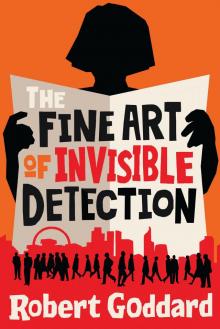 The Fine Art of Invisible Detection
The Fine Art of Invisible Detection One False Move
One False Move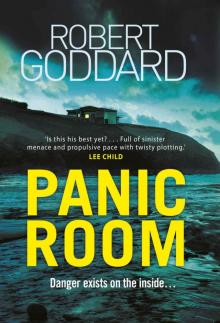 Panic Room
Panic Room Beyond Recall
Beyond Recall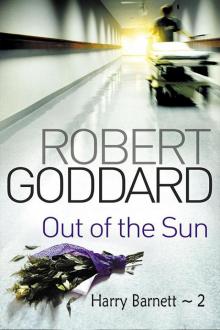 Out of the Sun
Out of the Sun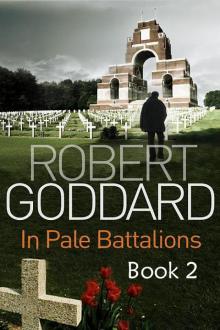 In Pale Battalions - Retail
In Pale Battalions - Retail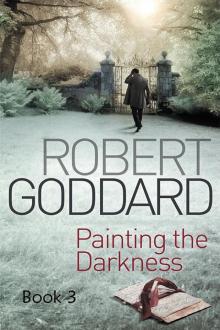 Painting The Darkness - Retail
Painting The Darkness - Retail The Corners of the Globe
The Corners of the Globe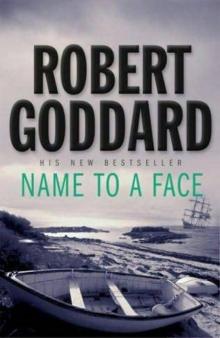 Name To a Face
Name To a Face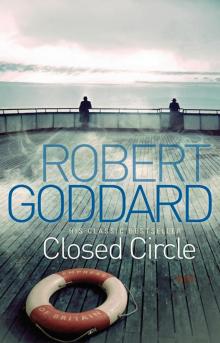 Closed Circle
Closed Circle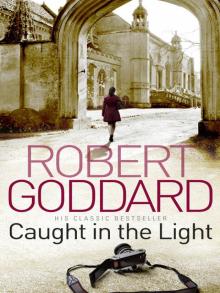 Caught In the Light
Caught In the Light Into the Blue
Into the Blue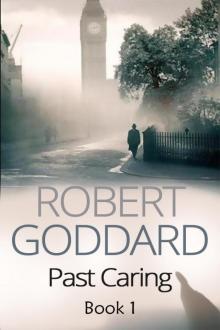 Past Caring - Retail
Past Caring - Retail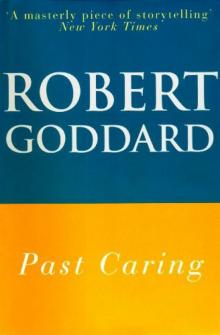 Past Caring
Past Caring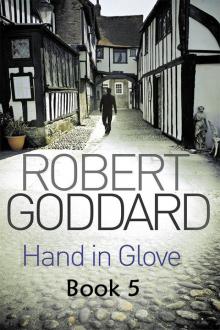 Hand In Glove - Retail
Hand In Glove - Retail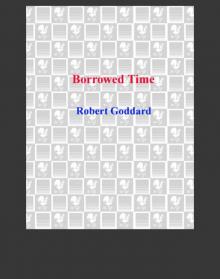 Borrowed Time
Borrowed Time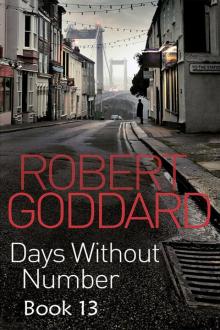 Days Without Number
Days Without Number James Maxted 03 The Ends of the Earth
James Maxted 03 The Ends of the Earth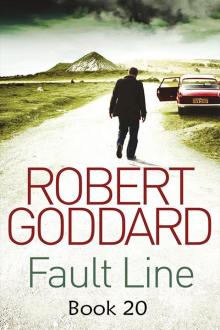 Fault Line - Retail
Fault Line - Retail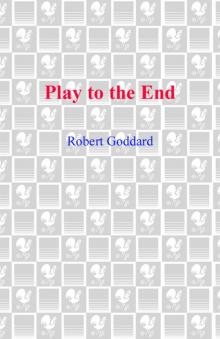 Play to the End
Play to the End Sea Change
Sea Change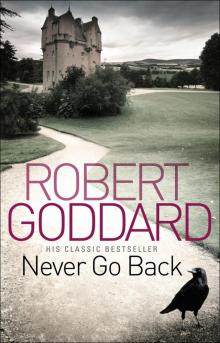 Never Go Back
Never Go Back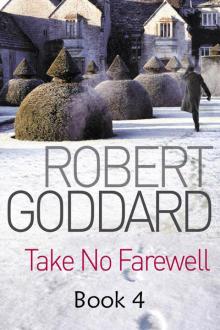 Take No Farewell - Retail
Take No Farewell - Retail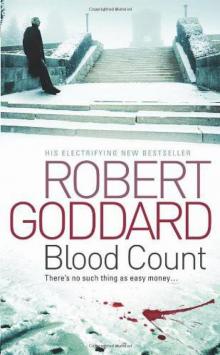 Blood Count
Blood Count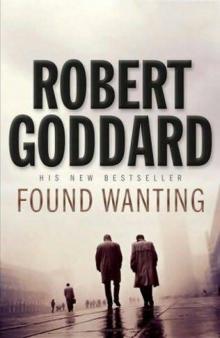 Found Wanting
Found Wanting Sight Unseen
Sight Unseen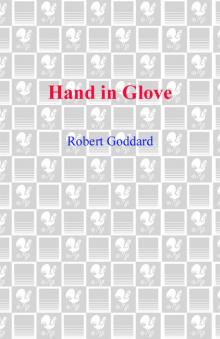 Hand in Glove
Hand in Glove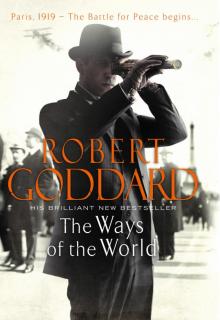 The Ways of the World
The Ways of the World